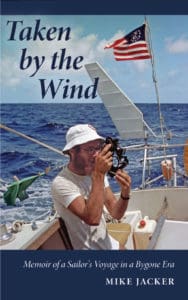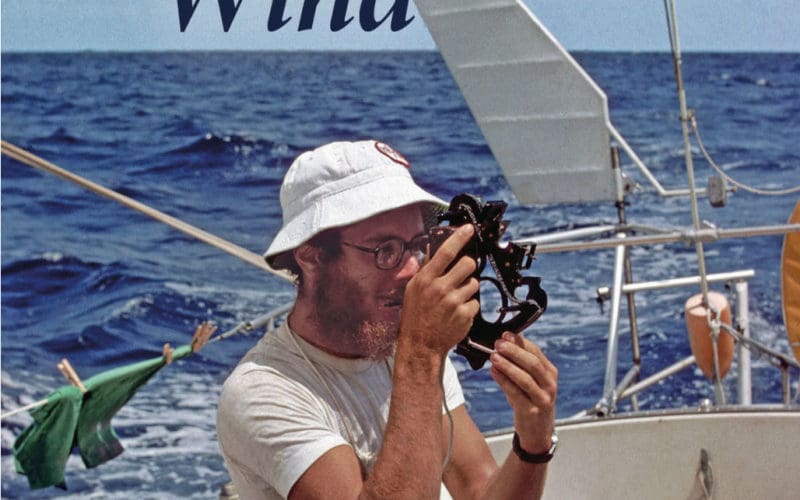 This memoir of an ocean sailing adventure by three young Americans in the 1970s, is not a swashbuckling yarn of lusty youth turned loose on the world. Mike Jacker was 22 years old when he and his friends purchased a Cal 2-30 and set out from New Orleans to journey westward across the Pacific and back, returning only just in time to start medical school and a conventional life.
This memoir of an ocean sailing adventure by three young Americans in the 1970s, is not a swashbuckling yarn of lusty youth turned loose on the world. Mike Jacker was 22 years old when he and his friends purchased a Cal 2-30 and set out from New Orleans to journey westward across the Pacific and back, returning only just in time to start medical school and a conventional life.
They were recent college graduates from educated, comfortable families in the Midwest. Theirs was not Sterling Hayden’s act of voyaging defiance – thumbing their noses at the establishment just for the hell and joy of it. They had the support of their families and knew how to use their stations to achieve their goals. Jacker writes: “I am aware that through the mere good fortune of my birth I was raised in the sheltered environment of a privileged white, upper middle class American family. My upbringing prepared me to explore the world at large . . . I was primed to seize the opportunity.”
Jacker and his buds carefully planned, and executed well (New Orleans, Mexico, Panama, Galapagos, Marquesas, Tahiti, Cook Islands, and finally Hawaii). It’s remarkable how much they learned and how methodically they proceeded on their cruise, from shakedown through each ocean crossing. When things broke, they fixed them. They designed and constructed a windvane from the merest skeleton parts; they navigated by dead reckoning, celestial navigation, and a clever deductive approach for piloting unknown shores. They had no single-sideband radio or weatherfax. They were living examples of a time that we now know was the last decade in human history when sailors needed to rely on training and skill alone to work their way across oceans. As a result, the book is a trove of inspiration, an elegy to a bygone America and world at large; the access afforded by white privilege, to be sure (which also had its drawbacks in 1970s Panama, for example), but also one of open-hearted innocence and resourcefulness. They smiled, and the world smiled back.
The journey ends in a form of heartbreak. Jacker himself, catching a flight back to the mainland to start classes, feels wracked with guilt and regret as he leaves one of his shipmates in Hawaii to clean and repair the boat to be put up for sale. “I truly felt guilty about leaving him. But I felt I had no choice. I was now working on a fixed schedule, with timetables and deadlines.” In a jarring encounter back on the streets of Chicago, he runs face to face with the sailing equivalent of the beat poet of the time, Tristan Jones, who was promoting a recent book. It provokes a surprising burst of anger in Jacker – at himself for turning away from the life he had briefly loved but was choosing not to keep.
Twain Braden

